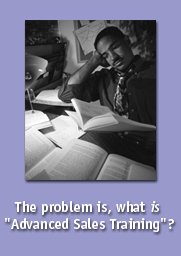
Advanced Sales Training
| Ïðîäàæè | ||||
| Sales.com | ||||
| Answers... | ||||
by Hal Slater
Selling, like any other skill, requires different levels of ability, depending upon the product and the specific situation encountered. While it is true that mastery of the basic skills is essential to success in sales, the same could be said for any field. The difference is that while other disciplines have created and adopted a path for advanced study, sales has not. Until recently, there has not even been information labeled "Advanced Sales Training," much less any thing that fulfilled the promise. It is customary in sales to continually review the "basics" regardless of experience level. This is like putting engineers through basic math class and the result is that they become insulted, bored and lose their excitement for their career.
 Many
organizations operate as though once a person learns to sell it's like
driving a car—they only have to think about their skills if they start
failing. This approach ignores the tremendous gain to be had from changing
the sales emphasis from marketing to training. A total dependence upon
marketing, such as advertising and telemarketing, has a limit to the sales
it can produce with no limit to the expense. Training, while slightly
slower to produce results, has a potentially unlimited payoff with a low
ceiling on costs. Clearly, an emphasis on training pays.
Many
organizations operate as though once a person learns to sell it's like
driving a car—they only have to think about their skills if they start
failing. This approach ignores the tremendous gain to be had from changing
the sales emphasis from marketing to training. A total dependence upon
marketing, such as advertising and telemarketing, has a limit to the sales
it can produce with no limit to the expense. Training, while slightly
slower to produce results, has a potentially unlimited payoff with a low
ceiling on costs. Clearly, an emphasis on training pays.
The problem is, what is "Advanced Sales Training?" What could anyone possibly say or do with serious, seasoned performers who have mastered one of the most competitive situations the American economic system has to offer? What you do NOT do, since sales is still more art than science, is to tell a proven seller to do things differently than they currently do them. There is more than one right way to make a sale, any person who has achieved success with a particular sale has developed a match between their customer's style, their style and the product. Any effort to change even part of that may result in a collapse of the whole process.
This is not to say that anyone does everything right and there is no room for improvement. However, any attempts to change a successful salesperson's behavior must be consistent with their personal style and approach. What can help them is a deeper understanding of customers and the sales process. Superior insight is a salesperson's stock–in–trade, improving that knowledge allows them to integrate any changes with their style.
We've discussed the "why" of Advanced Sales Training and the "what" is an emphasis on understanding the people and the process. The last question is "How to do it?" There are three key elements to a successful in–house sales training program:
These are important issues and they deserve careful consideration. Sales–intensive organizations must find creative means to retain and stimulate their seasoned performers. This will support their investment and inspire new salespeople as well. Advanced training can serve as both the "carrot" and the tool to get the best performance from your sales team.
Remember that "Nobody goes on hold." Everyday, in millions of businesses throughout the country, valuable salespeople are going through their days, dealing with the issues and problems we all face which erodes their performance. This is why successful companies emphasize and implement continuous improvement programs. Taking a wait–and–see approach to training assumes that training is remedial, not continuous, and every day that your company waits to implement advanced sales training your best resources are drifting away from you.
Sales is a lifetime career demanding and deserving of a lifetime of study, and without continuous and challenging training, many good salespeople decline. Job satisfaction is based more in a feeling of personal growth and fulfillment than earnings, and when management ignores these needs and depends too much upon earnings to motivate salespeople, their performance is adversely affected. This is an idea whose time has come and our industry is the most natural choice to lead the way.